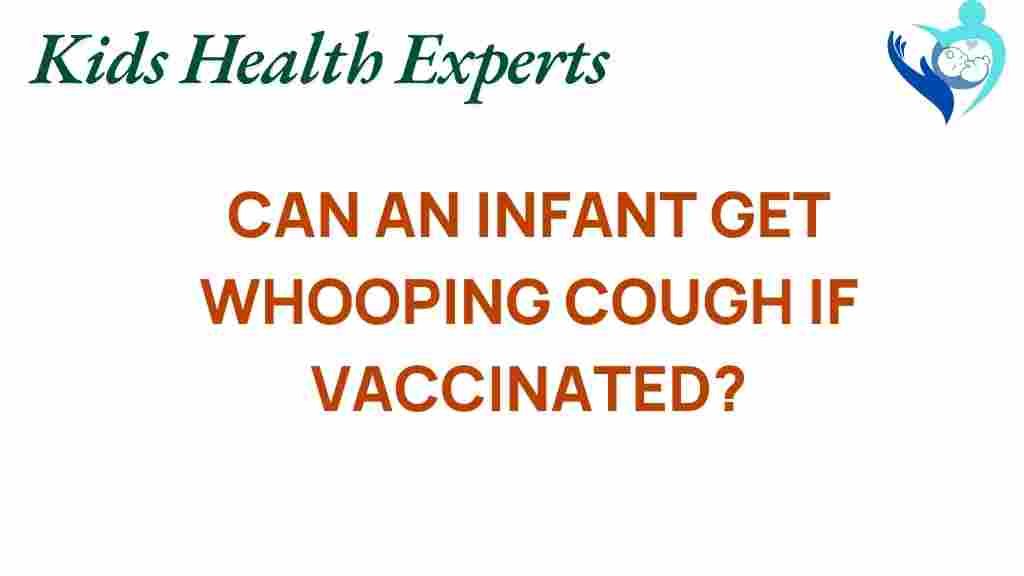Unraveling the Mystery: Can Vaccinated Infants Contract Whooping Cough?
In recent years, the resurgence of whooping cough, or pertussis, has raised significant health concerns among parents and healthcare providers alike. One question that often arises in this vaccination debate is whether vaccinated infants can still contract this highly contagious disease. This article aims to unravel the mystery surrounding whooping cough, its vaccine effectiveness, and the immunity it provides to infants.
Understanding Whooping Cough and Its Impact on Infant Health
Whooping cough, caused by the bacterium Bordetella pertussis, is a severe respiratory illness characterized by uncontrollable coughing fits and a distinctive “whoop” sound during inhalation. It can be particularly dangerous for infants, leading to complications such as pneumonia, seizures, and even death.
The Importance of Vaccination
Vaccination is a crucial tool in preventing whooping cough and protecting infant health. The DTaP vaccine, which stands for Diphtheria, Tetanus, and Pertussis, is given to children in a series of shots starting at 2 months of age. The vaccine effectively reduces the incidence of whooping cough and provides immunity against the disease.
Vaccine Effectiveness: How Well Does It Work?
The effectiveness of the pertussis vaccine has been a topic of ongoing research. Studies indicate that:
- The DTaP vaccine is approximately 80-90% effective in preventing severe cases of whooping cough.
- Vaccine-induced immunity tends to wane over time, leading to a higher risk of infection in older children and adults.
- Boosters, such as the Tdap vaccine for adolescents and adults, are recommended to maintain immunity and reduce transmission.
Can Vaccinated Infants Contract Whooping Cough?
Despite the effectiveness of the vaccine, the question remains: can vaccinated infants still contract whooping cough? The answer is yes, but several factors contribute to this possibility:
Factors Influencing Vaccine Breakthrough Cases
1. **Waning Immunity**: While infants receive their initial vaccinations, the immunity provided by the DTaP vaccine can decrease over time, making them susceptible to infection.
2. **Vaccine Coverage**: High levels of vaccination in the community help establish herd immunity, but if many individuals are unvaccinated, the risk of outbreaks increases.
3. **Strain Variation**: The emergence of new strains of Bordetella pertussis that may not be effectively targeted by the vaccine can also lead to breakthrough cases.
4. **Timing of Vaccination**: Infants are not fully protected until they have received all scheduled doses of the vaccine. The first dose is given at 2 months, but full immunity is not achieved until the completion of the vaccination series.
Health Concerns Associated with Whooping Cough
Whooping cough can lead to serious health complications, especially in infants. Some of the most significant health concerns include:
- Pneumonia: A common complication in infants, which can be life-threatening.
- Seizures: Caused by severe coughing fits or hypoxia.
- Brain Damage: Resulting from prolonged oxygen deprivation during severe coughing episodes.
- Death: Tragically, whooping cough can be fatal in young infants.
Step-by-Step Process: Protecting Your Infant from Whooping Cough
To minimize the risk of whooping cough in vaccinated infants, parents can take the following steps:
1. Ensure Timely Vaccination
Follow the recommended vaccination schedule provided by your pediatrician. The DTaP vaccine is given in a series of five doses:
- First dose: 2 months
- Second dose: 4 months
- Third dose: 6 months
- Fourth dose: 15-18 months
- Fifth dose: 4-6 years
2. Get Booster Vaccines
Ensure that all caregivers and family members receive the Tdap booster to reduce the risk of transmitting whooping cough to your infant.
3. Monitor Community Immunization Rates
Be aware of vaccination rates in your community. Areas with low vaccination rates are at higher risk for outbreaks.
4. Practice Good Hygiene
Encourage frequent handwashing and avoid close contact with individuals showing respiratory symptoms.
Troubleshooting Tips: What to Do if Your Infant Shows Symptoms
If your infant exhibits symptoms of whooping cough, such as persistent coughing, difficulty breathing, or a “whooping” sound, take the following actions:
1. Seek Medical Attention
Contact your pediatrician immediately for advice and potential testing. Early diagnosis is critical for effective treatment.
2. Follow Treatment Guidelines
If diagnosed with whooping cough, follow your doctor’s treatment plan, which may include:
- Antibiotics to reduce the severity of symptoms and prevent spreading the infection.
- Supportive care to help manage coughing and breathing difficulties.
3. Isolate the Infant
To prevent spreading the disease to others, keep your infant away from other children and vulnerable individuals until cleared by a healthcare provider.
Conclusion: The Importance of Vaccination and Ongoing Awareness
In conclusion, while vaccinated infants can contract whooping cough, the risk is significantly reduced through timely vaccinations and community immunity. Parents must remain vigilant about their child’s vaccination schedule and be aware of health concerns associated with this disease. As the vaccination debate continues, it is essential to rely on scientific evidence and public health guidelines to protect our most vulnerable populations.
For more information on vaccine effectiveness and infant health, consider visiting CDC: Whooping Cough (Pertussis).
By understanding the risks and taking proactive measures, we can help ensure the health and safety of our infants against whooping cough and other vaccine-preventable diseases.
If you would like to learn more about the ongoing vaccination debate and its impact on public health, check out our detailed article here.
This article is in the category Vaccines and created by KidsHealthExperts Team

1 thought on “Unraveling the Mystery: Can Vaccinated Infants Contract Whooping Cough?”